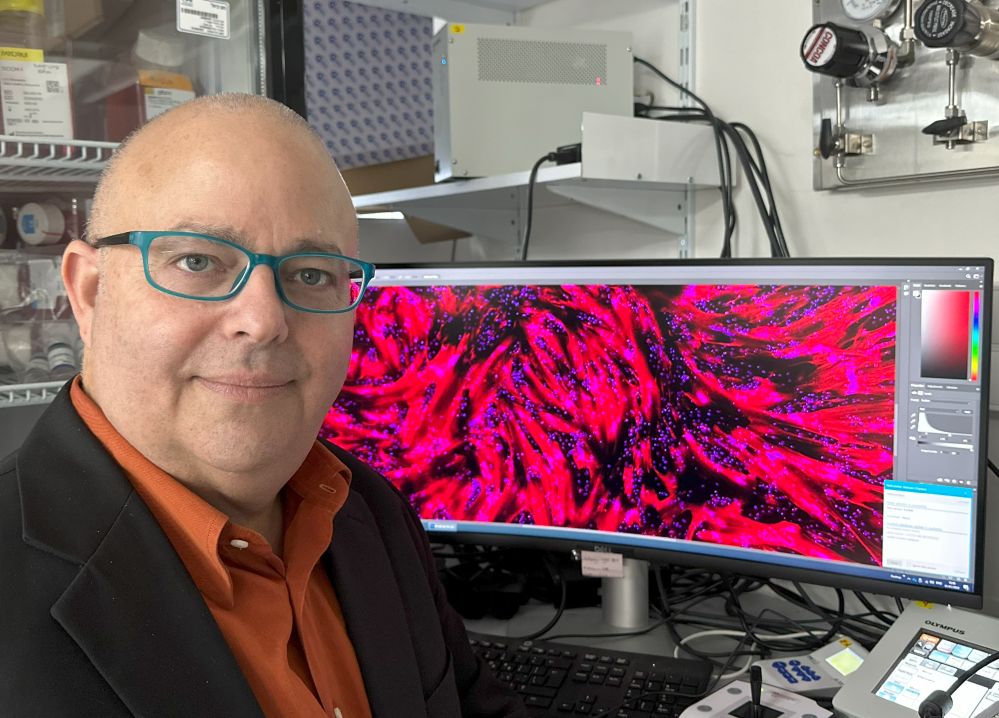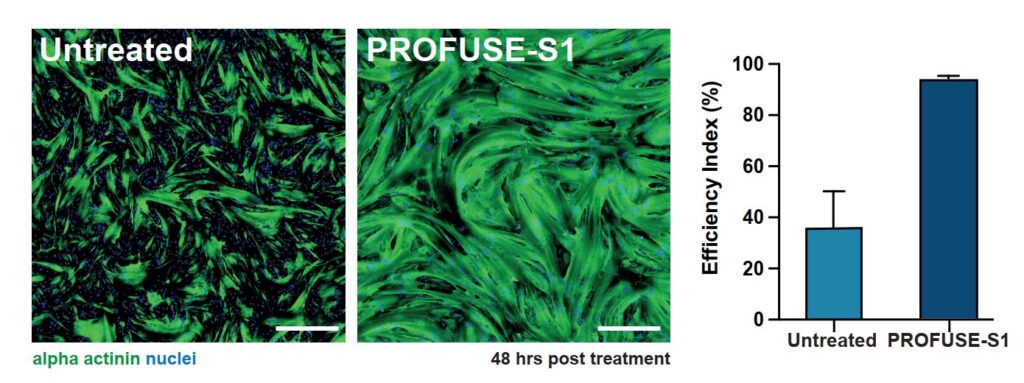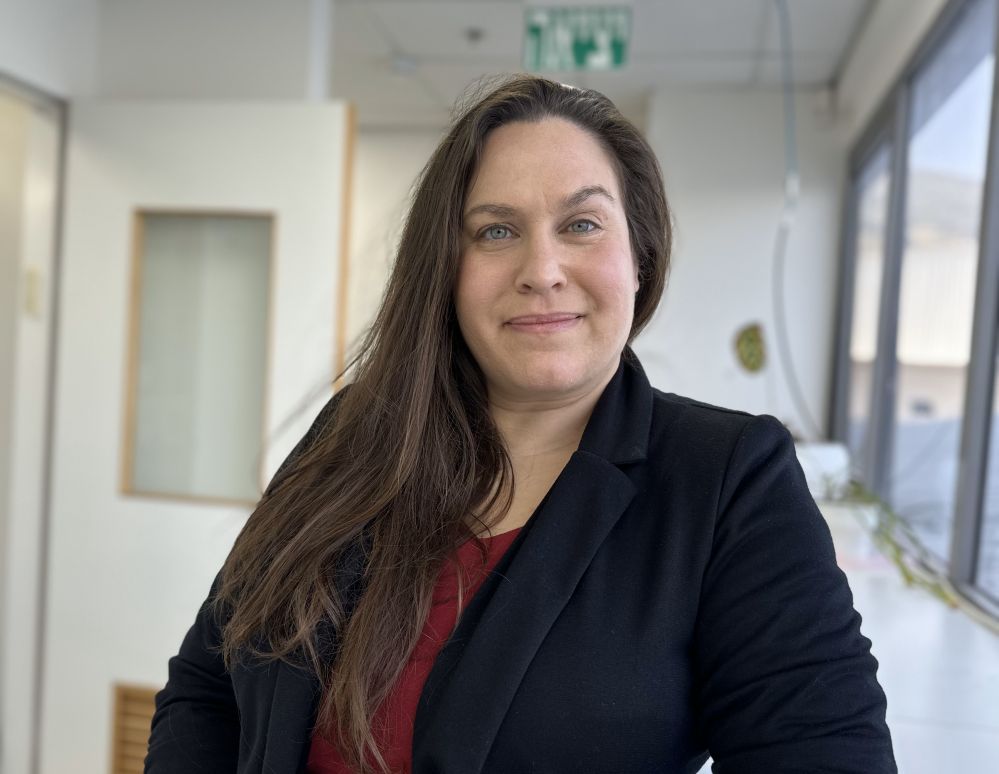Israeli startup ProFuse Technology—best-known for media supplements claimed to dramatically increase the speed and efficiency of muscle tissue formation in cultivated meat—has moved into new territory with the launch of bovine cell lines optimized for muscle growth.
The ‘PROFUSE-B8’ bovine myoblasts—muscle progenitor cells—are spontaneously immortalized such that they will keep dividing indefinitely (so you don’t need to keep going back to the host animal to secure new cells) without the use of genetic engineering.
According to CEO Guy Nevo Michrowski, the line demonstrates high efficiency both in proliferation (the initial phase of cultivated meat production involving population doubling) and in the differentiation and maturation phase (where cells turn into muscle tissue).
It is also “highly stable,” he tells AgFunderNews: “We have been running it for over a year and we have passaged it for the 90th time. This means stability in performance.”
He adds: “It is the only cell line in the industry that is an ideal building block for a muscle production system that does not use GMO. We plan to license it to cultivated meat companies interested in developing bovine muscle products. We are also developing other cell lines with the same characteristics including porcine, ovine, avian and fish cell lines.”
When used in conjunction with ProFuse Tech’s PROFUSE-S1 media supplement, cultivated meat companies can achieve “unparalleled efficiency” through higher yields and shorter production cycles and “a substantial reduction in production costs,” claims the company, which was formed in 2021 to apply science developed at the Weizmann Institute of Science.

A spontaneously immortalized bovine myoblast cell line
Cofounder and CTO Dr. Tamar Eigler-Hirsh explains: “Most companies who are focusing on muscle are working with primary cells [that do not proliferate indefinitely] and they have their limitations. To get around that, you need to genetically engineer them to immortalize them, which doesn’t always result in a line that differentiates well into muscle.
“We’ve managed to generate a spontaneously immortalized bovine myoblast cell line that grows incredibly well with a population doubling time of less than 24 hours, without using genetic engineering.”
To ‘spontaneously’ immortalize a cell line, she says, “You basically select for the cells that survive [after multiple divisions] because they have undergone some type of spontaneous mutation, which gives them some type of survival advantage. And those cells will continue to grow. We found several lines that survived, but PROFUSE B8 is the line that performed the best.
“We’ve been growing it in the lab for over a year and we’re at well over 300 population doublings. The beauty of this line is that it differentiates very well and responds very well to our media supplements. Alone the PROFUSE B8 cells will get to about a 40% differentiation efficiency or fusion index, but when you add our media supplement, that figure goes up to 97% within 48 hours after treatment.”
She adds: “If you’re working with primary bovine cells [that have not been immortalized], you might also get a 30-40% differentiation efficiency, but the difference is that after 10 or 11 passages, you have to go back to your master cell bank or the animal and start the process again [because the cells stop dividing]. And whenever you go and take another biopsy from an animal for producing primary cells, they are never exactly the same.”
While some companies have used genetic engineering to immortalize cell lines, they don’t always differentiate very well, she claims.
Is enabling tech for cultivated meat a risky bet right now?
But how big is the immediate market opportunity for products that optimize tissue production? After all, most cultivated meat startups are initially focused on growing cell biomass that can be combined with plant-based meat to create a minimum viable product, rather than making muscle tissue.
And isn’t it inherently risky to build a business around supplying enabling technologies (cell lines, media supplements) for an industry that has not yet been proven at scale?
According to Michrowski: “That’s a fair question, and to mitigate the risk of being dependent on cultivated meat, we’re also targeting other industries such as regenerative medicine, drug discovery and academia. We’ve been aware from mid-2022 that we were some way away from being in a position where we were going to be able to generate meaningful revenues from selling our media supplements [to cultivated meat companies making muscle tissue in more structured products].
“Licensing cell lines is a way to generate revenue in the meantime, both from cultivated meat companies and companies in other fields.”
Asked about ProFuse’s runway, he adds: “We have been able to secure equity funding of $4.25 million and about the same in grants. Our burn rate is quite low, so our runway is quite long.
“2024 is going to be difficult for many cultivated meat companies, and for the next two years, our revenue is going to come from licensing fees [for the cell line] and service fees and then slowly, we’re going to see product-based revenues [from media supplement sales] picking up I expect in four to five years.”

ProFuse Technology’s first product—a media supplement called PROFUSE-S1—speeds up and optimizes skeletal muscle tissue formation (myogenesis) such that firms can produce more meat, more quickly. A second generation of the supplement is under development now.
Phase one of myogenesis begins with rapid cell division and multiplication (the proliferation phase) of myoblasts (muscle stem cells) in a nutrient-rich media. In the second phase (the differentiation phase), the myoblasts stop dividing and start to differentiate by fusing to form nascent myotubes (developing muscle fibers with a tubular appearance). Next, in a secondary fusion stage, these small myotubes start fusing with myoblasts to form bigger myotubes, which finally mature into muscle fibers (the maturation phase).
Typically, to move from the proliferation phase to the differentiation phase, companies will reduce the growth factors in the media and the cells will stop dividing in this ‘depleted’ or ‘reduced’ media and gradually start to differentiate and mature.
Depending on the species, this differentiation and maturation phase can take days or even weeks; it is not always super-efficient, since only a certain percentage of myoblasts will fuse to form muscle fibers in any given production cycle, says ProFuse Technology.
By administering a cocktail of small molecules (a media supplement) that target a molecular signaling pathway regulated by an enzyme called ERK, ProFuse effectively flicks a biological switch. This switch triggers all the myoblasts to immediately start to differentiate and activates another protein that is involved in the secondary fusion phase, where small myotubes fuse with myoblasts to create bigger muscle fibers.
According to Michrowski, the supplement is considered to be a processing aid for regulatory purposes. “We’re completing our toxicity studies to show it is safe and so we can provide our customers with this safety dossier that they can include as part of their regulatory submissions.”





